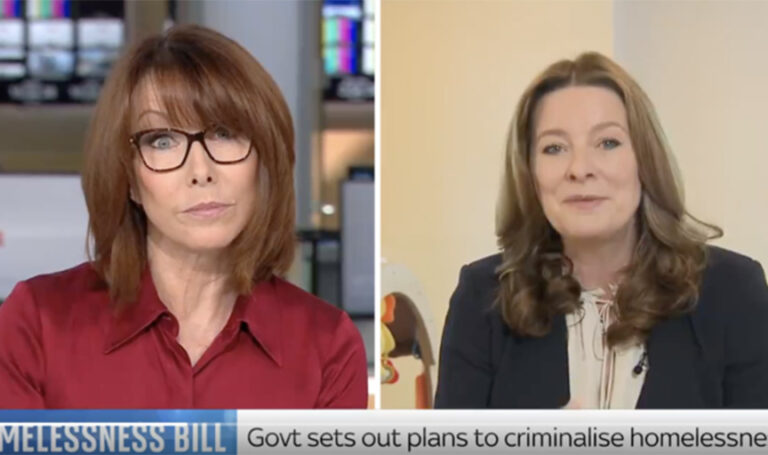Tory MP Gillian Keegan asked to justify arresting homeless people for their smell
Rishi Sunak is currently grappling with a growing rebellion within the Conservative Party over contentious plans to criminalise homelessness as part of a high-profile crime bill scheduled for enactment this year.
Remember when Suella Braverman infamously labelled homelessness as a “lifestyle choice”? Regrettably, it wasn’t a figment of imagination plucked from a dystopian Black Mirror episode. This controversial Criminal Justice Bill is, in fact, an integral component of the UK government’s flagship crime legislation. It aims to empower police in England and Wales to levy fines or evict rough sleepers who are deemed to be causing a “nuisance.”
Despite the government voting for its repeal two years ago, rough sleeping remains illegal under the 200-year-old Vagrancy Act from 1824.
However, the prospect of penalising homeless individuals has sparked outrage among numerous MPs from both the left and right factions of the Conservative Party, who have signalled their intent to oppose these measures. According to Sky News, approximately 40 Conservative MPs have voiced their dissent to party whips, expressing concerns about the bill’s potential repercussions.
Speaking with The Guardian, Bob Blackman, a Tory MP leading the rebellion, expressed the widespread apprehension among colleagues, denouncing the bill’s provisions as unjust and punitive towards those forced to endure life on the streets.
Blackman emphasised the urgent need for ministers to reassess the proposed legislation, urging a more compassionate approach, expressing: “A lot of colleagues believe that the bill as it stands is completely unacceptable because it would have the effect of criminalising people who have no choice but to sleep on the streets. We are urging ministers to think again.”
Meanwhile, during an interview with Sky News, Education Secretary Gillian Keegan faced sharp criticism from presenter Kay Burley for seemingly smiling when asked about the new bill.
When confronted with the possibility of homeless individuals being arrested merely for “smelling,” Keegan’s response was met with widespread condemnation.
Burley’s pointed questions underscored the absurdity of such provisions, prompting Keegan to awkwardly deflect and evade direct answers. “What about if they smell? The bill states rough sleepers might be considered a nuisance if they smell. So, if you smell you might be arrested?” Burley asked the politician.
Watch as a Govt minister explains a new law to arrest rough sleepers if they smell…#KayBurley AB pic.twitter.com/nliXkPtrWJ
— Kay Burley (@KayBurley) April 2, 2024
The legislation as currently drafted indeed indicates that individuals could face arrest for causing “excessive” damage “to the environment,” which includes issues related to “smells.” When this concern was raised to Keegan by Burley, the Education Secretary responded: “I don’t know. I haven’t looked at that detail of it.”
The legislation, as currently formulated, raises troubling questions about the treatment of homeless individuals and the erosion of their rights. Proposed offences targeting “excessive” environmental damage, including odours, have drawn condemnation for their arbitrary and discriminatory nature. Keegan’s indifferent response to these concerns only serves to underscore the apathy of the government’s approach.
Homelessness charities have sounded the alarm, warning that these measures will further marginalise and criminalise homeless people, perpetuating cycles of poverty and exclusion.
Let’s not forget that according to data from the Joseph Rowntree Foundation (JRF), approximately 14.4 million individuals, including 4.2 million children, were living below the poverty line in 2021-22. This represents a troubling increase from the previous year, when 13.4 million people, including 3.9 million children, were affected.
The situation has been characterised by the foundation as “social failure at scale,” with around 6 million individuals experiencing severe poverty, defined as falling below 40 per cent of the median income after accounting for housing costs. To illustrate, a family with two children under the age of 14 would be deemed to be in severe poverty if their income falls below £14,600.
Criminalising homelessness not only scapegoats the most vulnerable individuals but also absolves the government of its duty to address systemic inequalities. This approach is particularly difficult given the current crisis facing the UK, exacerbating existing social tensions and widening the gap between the marginalised and the empowered. Instead of offering meaningful solutions to address the root causes of homelessness, ministers are opting for punitive measures that will only exacerbate the suffering of vulnerable individuals.






